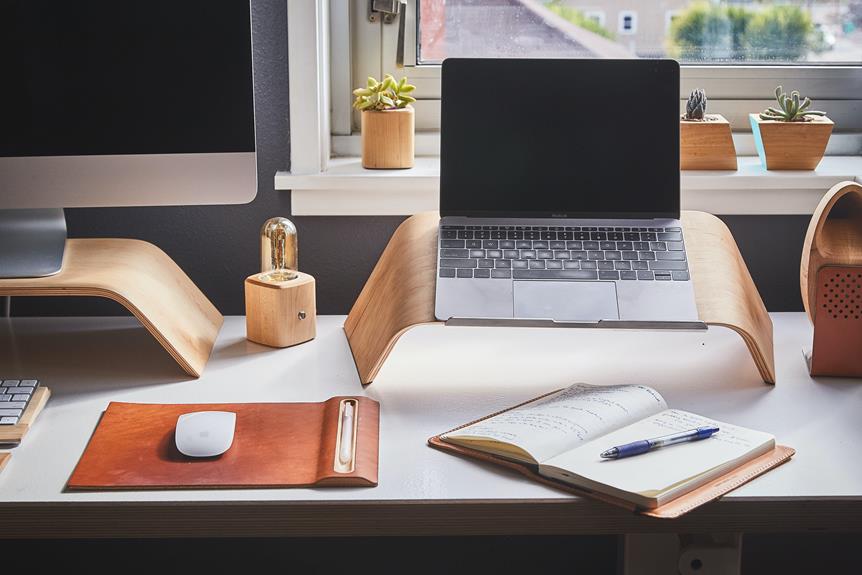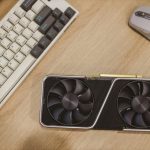Wondering if it's okay to place your PC on the floor in your home office?
There are some important factors to consider for optimal performance and longevity.
Let's explore the potential risks and best practices for safe PC placement to ensure your setup runs smoothly.
Key Takeaways
- Placing the PC on the floor can lead to various risks including dust accumulation, pest infestation, and physical damage.
- Placing the PC on an elevated surface promotes better airflow and efficient cooling, preventing overheating and hardware malfunctions.
- Regular cleaning of internal components, organizing cables, and maintaining optimal airflow helps prevent dust accumulation and extends the lifespan of PC hardware.
- Positioning the PC on an elevated desk or stand, using spill-resistant accessories, and securing cables can help prevent spills and damage to the PC.
Potential Risks of Floor Placement
You should avoid placing your PC on the floor due to the potential risks of dust accumulation and accidental kicking. When your PC sits on the floor, it's more susceptible to dust, which can lead to electrical hazards and static buildup. Dust accumulation within the PC can obstruct airflow, potentially causing overheating and hardware malfunctions.
Additionally, the floor is a common area for pest infestation, and having your PC there can expose it to the risk of pests causing damage or creating electrical hazards. Moisture exposure is another concern when placing your PC on the floor, especially if the area is prone to spills or leaks. Moisture can lead to corrosion and short circuits, posing a risk to your PC's functionality and safety.
Moreover, accidental kicking or tripping over the PC on the floor can result in physical damage to the computer or even cause injury. To mitigate these risks, it's advisable to place your PC on a raised platform or desk to minimize the chances of these potential hazards.
Impact on Airflow and Cooling
Placing your PC on the floor can impede airflow and cooling, potentially leading to overheating and hardware malfunctions. Airflow efficiency is crucial for maintaining optimal temperatures within your PC.
When your computer is on the floor, it's more susceptible to dust and debris accumulation, which can obstruct airflow and lead to poor temperature regulation. This can cause your PC's components to run hotter than intended, increasing the risk of performance degradation and potential damage.
To ensure proper airflow and cooling, it's advisable to place your PC on an elevated surface, such as a desk or a stand designed specifically for PCs. Elevating your PC helps prevent dust buildup and allows for better airflow around the case, promoting efficient cooling.
Additionally, regularly cleaning your PC's intake and exhaust vents, as well as using air filters, can further aid in maintaining optimal airflow efficiency and temperature regulation.
Dust Accumulation and Maintenance
To mitigate the impact of dust accumulation on your PC and ensure its optimal performance, regular maintenance and cleaning of internal components are essential. Elevating your PC can also help prevent dust buildup and promote efficient cooling, extending the lifespan of your hardware.
Dust accumulation within your PC can hinder airflow, leading to overheating and decreased performance. To combat this, it's crucial to establish a regular cleaning routine. The frequency of cleaning will depend on the environment in which your PC is situated. For environments prone to dust, more frequent cleaning may be necessary.
Additionally, organizing your cables can aid in reducing dust buildup. Tangled and messy cables can trap and accumulate dust, impeding airflow and making it harder to clean your PC effectively. By keeping cables organized and out of the way, you can minimize dust accumulation and simplify the cleaning process.
Regular maintenance, including cleaning internal components and organizing cables, is key to preventing dust-related issues and maintaining the optimal functioning of your PC.
Spill and Damage Prevention
Positioning your PC on an elevated surface can reduce the risk of spills and physical damage, safeguarding its functionality and longevity. To ensure spill and damage prevention, follow these essential steps:
- Spill Protection: Invest in spill-resistant accessories, such as a spill-proof keyboard and mouse, to minimize the risk of liquid damage to your PC components.
- Cable Management: Organize and secure cables to prevent tripping hazards and accidental spills caused by tangled wires. Utilize cable management solutions, such as cable clips or sleeves, to keep wires tidy and out of harm's way.
- Elevated Placement: Opt for an elevated desk or a dedicated PC stand to keep your computer away from potential spill zones, such as the floor, where liquid accidents are more likely to occur.
- Regular Maintenance: Routinely inspect your PC and its surroundings for any signs of potential spill hazards, such as open containers of liquid or unstable surfaces. Additionally, regularly clean and dust your PC to maintain its optimal functionality and prevent damage.
Tips for Safe PC Placement
Consider elevating your PC to a sturdy desk or stand to minimize potential hazards and ensure safe placement in your home office. An ergonomic setup not only enhances comfort but also reduces the risk of strain and injury.
When positioning your PC, ensure that the monitor is at eye level to prevent neck and back strain. Additionally, maintaining proper posture by using an adjustable chair can further promote a healthy work environment.
Cable management is crucial for safe PC placement. Keep cords organized and out of the way to prevent tripping hazards and potential damage to the cables. Utilize cable clips or ties to secure cords and prevent them from tangling or becoming a safety hazard.
Position your PC in a well-ventilated area to prevent overheating and ensure optimal performance. Adequate airflow around the computer tower is essential for preventing heat buildup.
Frequently Asked Questions
Can Placing My PC on the Floor Affect Its Performance or Lifespan?
Placing your PC on the floor can negatively impact its performance and lifespan. Dust can affect airflow and cause overheating. Carpets can worsen this by trapping more dust than hardwood floors, potentially shortening your PC's longevity.
Are There Any Specific Types of Flooring That Are Safer for PC Placement?
For PC placement, consider safer flooring options like hardwood or laminate to minimize dust. Elevating your PC can aid in cable management and airflow. Regular cleaning and proper ventilation will help prevent dust buildup.
How Often Should I Clean My PC if It's Placed on the Floor?
You should clean your PC more often if it's on the floor. Dust and debris accumulate faster there. Consider raising it off the floor to reduce the need for frequent cleaning. Regular maintenance tips include using compressed air and soft brushes.
What Are Some Effective Ways to Prevent Spills and Damage to a PC on the Floor?
To prevent spills and damage to your PC on the floor, consider cable management and using elevated platforms. Organize cords to avoid tripping hazards and place the PC on a raised surface to protect it from spills and dust.
Are There Any Additional Accessories or Products That Can Help Protect a PC Placed on the Floor?
To protect your PC on the floor, consider additional accessories like PC floor stands for airflow and dust filters. Use cable management to organize and secure cords, preventing damage. These measures ensure safety and longevity for your computer.




